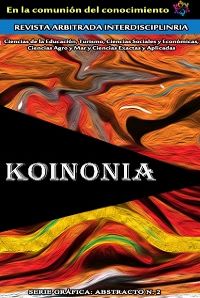Pedagogical strategies for the knowledge society, information and internet culture
DOI:
https://doi.org/10.35381/r.k.v7i14.1876Keywords:
Educational innovations, teaching method innovations, teaching methods. (UNESCO Thesaurus).Abstract
The objective of this article is to analyze, from a cultural and sociotechnical perspective, the necessary pedagogical strategies in the framework of the information and communication society as a result of the pandemic generated by Covid-19. We start from the idea that education in Mexico has suffered a deterioration in quality and access for students in general, but specifically at the postgraduate level, by virtue of the teaching practice that traditionally has been face-to-face, suddenly, emigrated to educational virtualization. Situation we consider has an impact on the process of knowledge transmission. Therefore, it is necessary to implement pedagogical strategies that reinforce learning from teachers and influence the professional development of those who are being trained in these years of pandemic. It is concluded that the use of electronic tools through the internet does not mean the improvement of educational practice.
Downloads
References
Ander-Egg, E. (2003). Metodología y práctica del desarrollo de la comunidad. ¿Qué es el desarrollo de la comunidad? [Community development methodology and practice - What is community development?]. Buenos Aires-México, Grupo Editorial Lumen. Recuperado de https://n9.cl/i23em
Beck, U. (1988). La sociedad del riesgo: hacia una nueva modernidad [The risk society: towards a new modernity]. Paidós, Ibérica, S.A. España. 305p
Castells, M. (2001). La galaxia del internet [The galaxy of the internet]. Documento en línea. Recuperado de https://n9.cl/coxkj
Contreras, S. (2021). El poder de Google, Amazon, Facebook, Apple y Microsoft [The power of Google, Amazon, Facebook, Apple and Microsoft]. Documento en línea. Recuperado de https://n9.cl/6dbjm
Delors, J. (1996). La Educación encierra un tesoro, informe a la UNESCO de la Comisión Internacional sobre la Educación para el Siglo XXI (compendio) [Learning: The Treasure Within, Report to UNESCO of the International Commission on Education for the Twenty-first Century (Compendium)]. https://unesdoc.unesco.org/ark:/48223/pf0000109590_spa
Diaz Barriga, Á. (2020). Seminario Internacional. Los desafíos de la profesión docente en las culturas digitales [International Seminar. The challenges of the teaching profession in digital cultures]. [video]. Consultado en la web https://www.youtube.com/watch?v=SEKNFmrpHfg&t=0s
García-Canclini, N. (2018). Cómo investigar la era comunicacional del capitalismo [How to investigate the communicational era of capitalism]. Desacatos. Revista De Ciencias Sociales, (56), 90–105. https://doi.org/10.29340/56.1879
Giménez, G. (2005). La cultura como identidad y la identidad como cultura [Culture as identity and identity as culture]. En III Encuentro Internacional de Promotores y Gestores Culturales. SIC México. Sistema de Información Cultural. Guadalajara, Jalisco. Consultado en la Web: https://sic.cultura.gob.mx/ficha.php?table=centrodoc&table_id=70
INEGI (2021). En México hay 84.1 millones de usuarios de internet y 88.2 millones de usuarios de teléfonos celulares: ENDUTIH 2020 [In Mexico there are 84.1 million internet users and 88.2 million cell phone users: ENDUTIH 2020]. Recuperado de https://n9.cl/6u0z8
Morin, E. (2010). ¿HACIA EL ABISMO? ¿Globalización en el siglo XXI [INTO THE ABYSS? Globalization in the 21st century]. Ediciones Paidós, Ibérica. 1ª Ed. Barcelona. P.194
Morin, E. (2015). Enseñar a vivir. Manifiesto para cambiar la educación [Teaching to live. Manifesto to change education]. 1 ª ed. Ciudad Autónoma de Buenos Aires: Nueva Visión. Recuperado de https://n9.cl/58skk
Muñoz-Izquierdo, C. (1979). Hacia una redefinición del papel de la educación en el cambio social [Towards a redefinition of the role of education in social change]. En Revista Latinoamericana de Estudios Educativos. México, IX (2), 131-150. Consultado en la web: https://www.cee.edu.mx/rlee/revista/r1971_1980/r_texto/t_1979_2_06.pdf
OECD. (2019). Higher Education in Mexico: Labour Market Relevance and Outcomes, Higher Education, OECD Publishing, Paris. https://doi.org/10.1787/9789264309432-en.
Pozo J., & Monereo C. (2009). Introducción: La nueva cultura del aprendizaje universitario o por qué cambiar nuestras formas de enseñar y aprender [Introduction: The new culture of university learning or why change our ways of teaching and learning]. En Psicología del aprendizaje universitario: La formación en competencias. Juan Ignacio Pozo y María del M. del P. Pérez Echeverría (coords.). pp: 9-28 Ediciones Morata. Madrid.
Proyecto Alternativo de Nación 2018-2024. (2018). Anexo dos. Plataforma electoral y programa de gobierno [Annex two. Electoral platform and government program]. Recuperado de https://n9.cl/2tocw
Rama, C. (2011). Paradigmas emergentes, competencias profesionales y nuevos modelos universitarios en América Latina [Emerging Paradigms, Professional Competencies and New University Models in Latin America]. Editor: EyC / BUAP.
Schwad, K. (2016). La cuarta revolución industrial [The fourth industrial revolution]. Libro en línea. Recuperado de https://n9.cl/exwi
Vermaas, P., Kroes, P., Poel, I., Franssen, M. & Houkes, W. (2011). A Philosophy of Technology. From Technical Artefacts to Sociotechnical Systems. Synthesis Lectures on Engineers, Technology, and Society. https://doi.org/10.2200/S00321ED1V01Y201012ETS014
World Stats Stats (2021). World Internet Users and 2021 Population Stats. Recuperado de https://www.internetworldstats.com/stats.htm
Published
How to Cite
Issue
Section
License
CC BY-NC-SA : Esta licencia permite a los reutilizadores distribuir, remezclar, adaptar y construir sobre el material en cualquier medio o formato solo con fines no comerciales, y solo siempre y cuando se dé la atribución al creador. Si remezcla, adapta o construye sobre el material, debe licenciar el material modificado bajo términos idénticos.
OAI-PMH URL: https://fundacionkoinonia.com.ve/ojs/index.php/revistakoinonia/oai.









